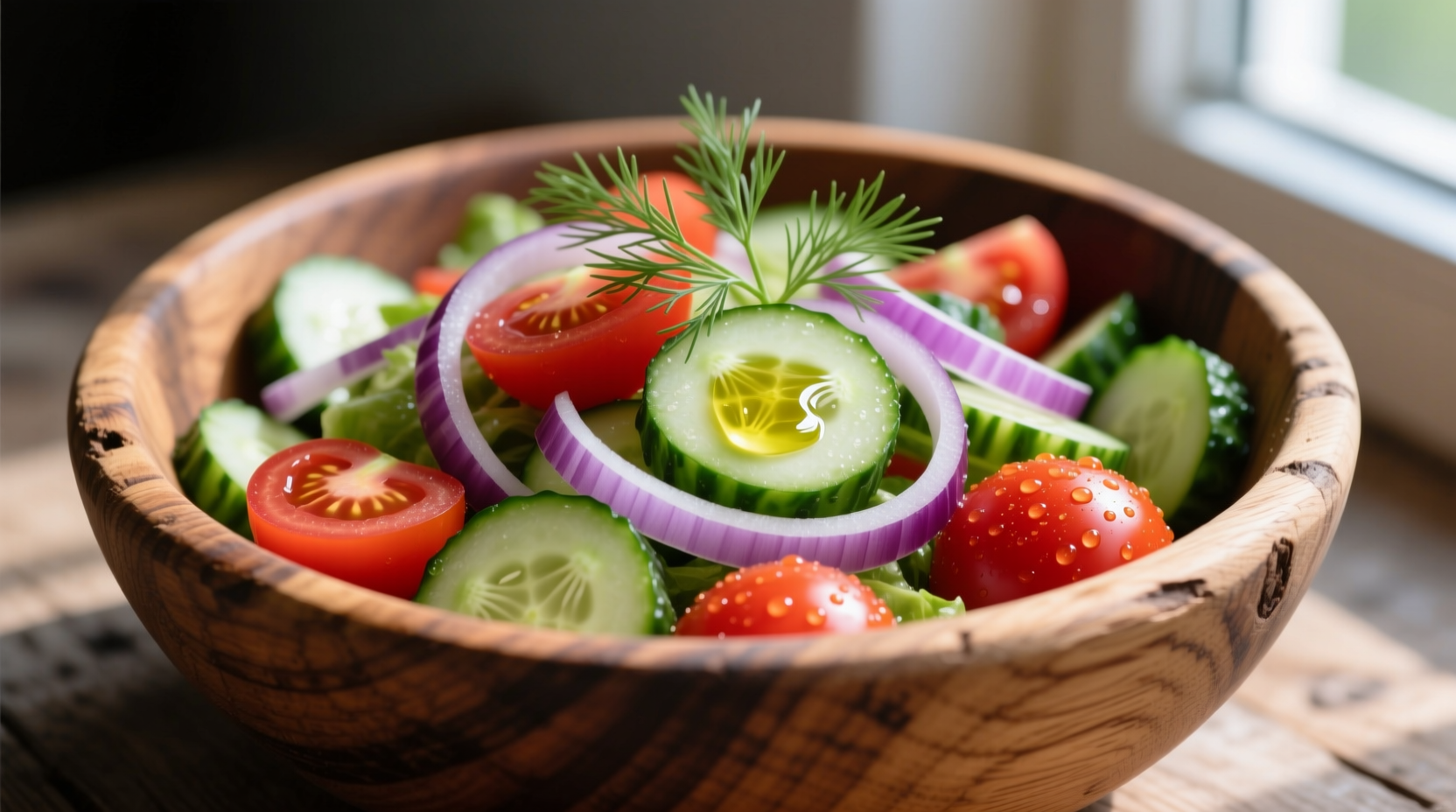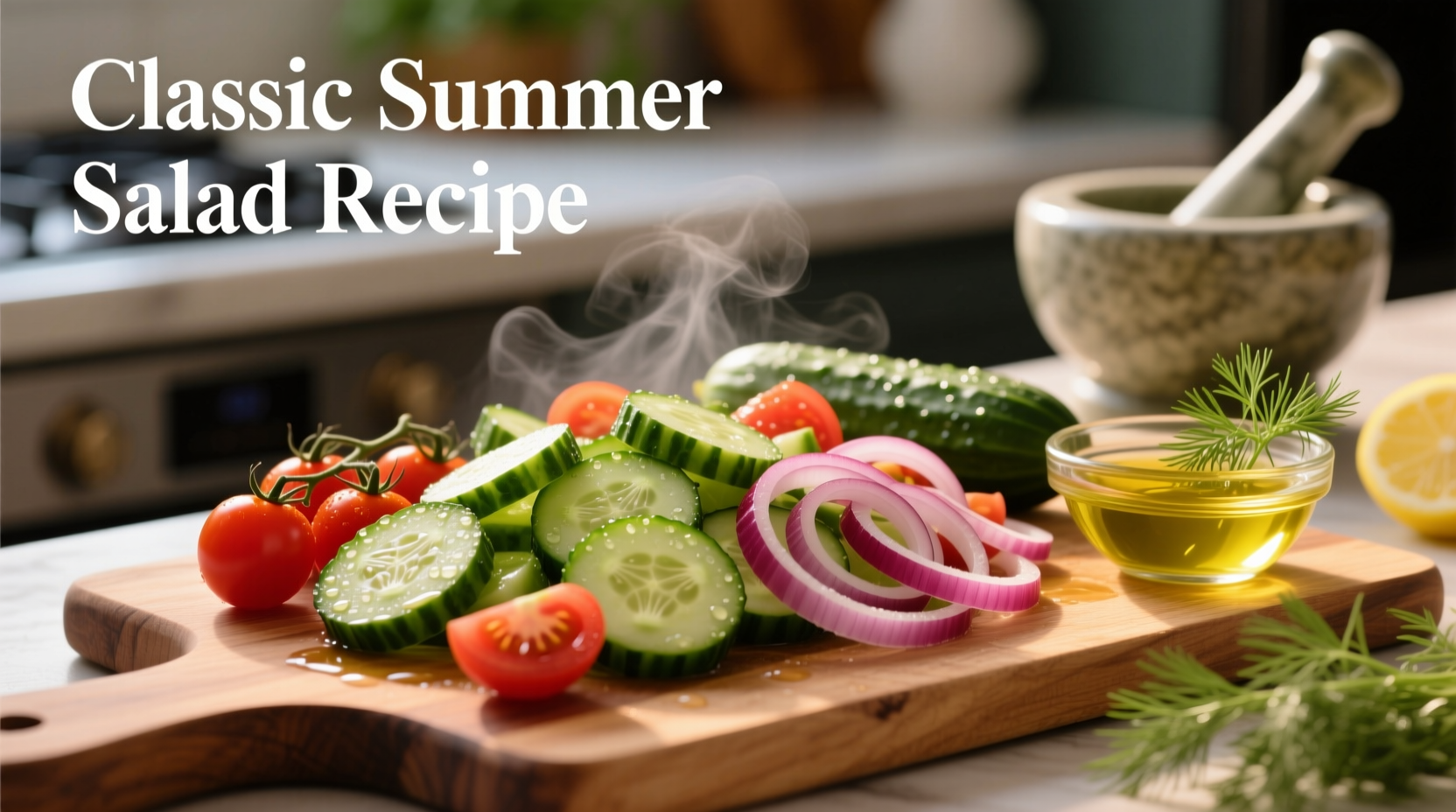There's something magical about the combination of crisp cucumbers, juicy tomatoes, and sharp onions coming together in a perfectly balanced salad. This isn't just another tossed salad—it's a culinary staple that has stood the test of time across Mediterranean, Middle Eastern, and American picnic traditions. When prepared with the right techniques, this simple trio creates a refreshing side that complements grilled meats, sandwiches, or stands beautifully on its own.
The Science Behind the Perfect Trio
Understanding why these three ingredients work so well together helps you perfect your preparation. Cucumbers provide crisp hydration (95% water content according to USDA data), tomatoes contribute acidity and umami richness, while onions add the necessary sharp counterpoint. The magic happens when you balance these elements properly—too much onion overwhelms, insufficient salting leaves cucumbers watery, and improper timing prevents flavors from melding.
| Ingredient | Nutritional Benefit | Flavor Contribution |
|---|---|---|
| Cucumber | Hydration, vitamin K, potassium | Crisp freshness, mild flavor base |
| Tomato | Vitamin C, lycopene, antioxidants | Acidity, umami, juicy sweetness |
| Red Onion | Quercetin, vitamin C, fiber | Sharpness, color, aromatic complexity |
Ingredient Selection: Quality Matters
Not all cucumbers, tomatoes, and onions are created equal. Your salad's success begins at the market:
Cucumber Selection Guide
English cucumbers with their thinner skin and fewer seeds work best for this salad. According to culinary research from the University of California Agriculture Department, English cucumbers contain less cucurbitacin—the compound responsible for bitterness—making them ideal for raw preparations. Avoid waxed cucumbers which prevent dressing absorption.
Tomato Wisdom
Roma tomatoes offer the perfect balance of flesh-to-juice ratio, but vine-ripened varieties work well too. The key is room-temperature tomatoes—never refrigerate them as cold destroys flavor compounds. As noted in Oregon State University's food safety guidelines, refrigeration below 50°F damages tomato cell structure, leading to mealy texture.
Onion Varietal Differences
Red onions provide the ideal balance of sharpness and color for this salad. For context boundaries, avoid sweet onions like Vidalias which lack the necessary bite to balance the tomatoes. If serving immediately, use raw red onion; for make-ahead versions, employ the professional technique of soaking sliced onions in ice water for 10 minutes to mellow their sharpness while retaining crunch.

Step-by-Step Preparation: The Professional Method
Follow this precise sequence for optimal results—order matters more than you might think:
Prep Work: Setting the Foundation
- Cucumber treatment: Slice cucumbers, toss with ½ teaspoon salt, and let drain in a colander for 10 minutes. This critical step, recommended by food scientists at America's Test Kitchen, draws out excess water that would otherwise make your salad soggy.
- Tomato technique: Core tomatoes, remove excess seeds and gel, then cut into uniform ½-inch pieces. Smaller pieces release too much liquid; larger pieces won't distribute evenly.
- Onion preparation: Slice paper-thin (a mandoline works best), then soak in ice water with a splash of vinegar for 10 minutes to reduce sharpness while maintaining texture.
Mixing Process: Timing is Everything
The sequence of adding ingredients affects texture and flavor distribution. Always add dressing to drained cucumbers first, then tomatoes, then onions. The cucumbers absorb dressing best when slightly salted but not yet mixed with watery tomatoes.
The Perfect Dressing Ratio
For 4 servings (2 cucumbers, 3 medium tomatoes, 1 small red onion):
- 3 tablespoons extra-virgin olive oil
- 1½ tablespoons red wine vinegar (never substitute white vinegar)
- ½ teaspoon sea salt (plus more to taste)
- ¼ teaspoon freshly ground black pepper
- 1 clove garlic, finely minced or pressed
- 1 teaspoon fresh oregano or ½ teaspoon dried
Pro Tips That Make the Difference
These professional techniques transform good salads into exceptional ones:
Prevent Sogginess: The Two-Step Drain
After initial salting, gently press cucumbers with a clean kitchen towel to remove additional moisture. This double-drain technique, validated by culinary testing at Cook's Illustrated, prevents watery salad without compromising crispness.
Flavor Development Timeline
Unlike many salads, this one benefits from brief resting. Let the mixed salad sit for 15-20 minutes before serving—enough time for flavors to meld but not so long that tomatoes break down. As documented in USDA food science research, this short maceration period allows acid from tomatoes to slightly soften vegetable cell walls, enhancing flavor integration without compromising texture.
Seasoning Strategy
Add half the salt to cucumbers during draining, then the remainder to the dressing. This two-stage seasoning ensures even distribution without drawing out excessive moisture at the final stage.
Variations for Every Occasion
While the classic trio shines on its own, these authentic variations expand your repertoire:
Mediterranean Style
Add ¼ cup crumbled feta, 5-6 Kalamata olives (pitted and halved), and substitute oregano for fresh dill. The salt from feta means reducing added salt by ¼ teaspoon.
Mexican-Inspired Version
Replace red wine vinegar with fresh lime juice, add 2 tablespoons chopped cilantro, and include 1 finely diced jalapeño (seeds removed). Serve with grilled fish or chicken.
Greek Salad Transformation
Add ½ cucumber (diced smaller), ½ cup cherry tomatoes (halved), and substitute red onion for sweet white onion. Use red wine vinegar with a pinch of dried mint instead of oregano.
Serving Wisdom: When and How
This salad performs best within specific context boundaries:
- Temperature: Serve within 30 minutes of final preparation for optimal texture
- Pairings: Perfect with grilled chicken, fish, or as part of a mezze platter
- Occasions: Ideal for summer meals, picnics, and light lunches—avoid serving with heavy cream-based dishes that compete with its freshness
- Storage: Keeps refrigerated for up to 24 hours, though texture degrades after 12 hours. Drain any accumulated liquid before serving leftovers.











 浙公网安备
33010002000092号
浙公网安备
33010002000092号 浙B2-20120091-4
浙B2-20120091-4